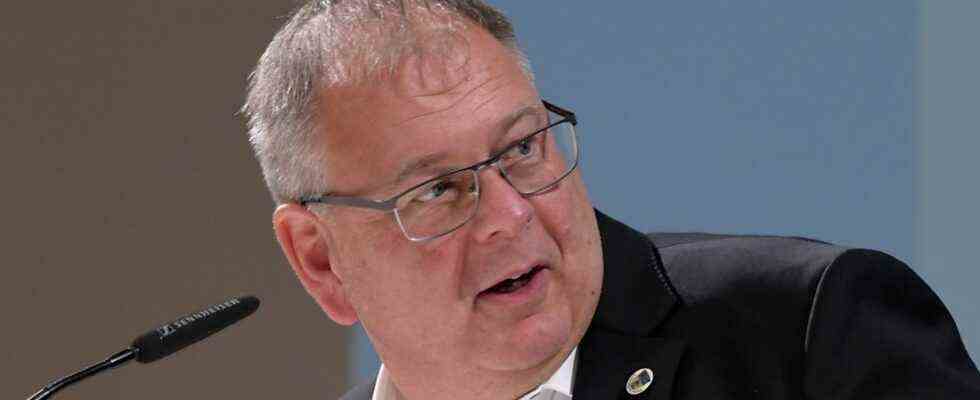Twice a year, the municipal council in Unterhaching has an enormous need to speak. Now the body is open to discussion anyway and is not known for keeping it short, but in February and December the parliamentary groups always work on multi-page speeches that seem to be getting longer and longer. At the end of the year, the parliamentary groups write the Christmas speeches, just before the carnival holidays it is always about the budget. And the higher the budget has become in recent years, the more wordy the contributions of some finance officers, which every party and group traditionally sends to the microphones on this occasion, and who often comment not only on the budget situation of the municipality, but also on the world as a whole explain.
The Unterhachinger municipal council currently has six factions, and together with the mayor makes a total of seven speeches, which should deal with the “record budget”, optionally also the “giant budget”. In 2022, by a total volume of 118 million euros, by an increase in the administrative budget by more than two million compared to the previous year to 89 million, by an increase in the asset budget by 2.5 million to almost 30 million. About debt, investments and withdrawals from reserves. “The financial situation of the municipality of Unterhaching is still good,” Mayor Wolfgang Panzer (SPD) summarized the draft budget on Wednesday evening, and somehow everyone agreed and unanimously gave a “yes” to the figures.
Trade tax is rising, income tax revenue is falling
Did you miss a number during Treasurer Udo Grafe’s presentation or didn’t listen properly to the mayor’s speech? The increase in trade tax revenue by 3.5 million to 34.8 million, the decrease in income tax by one million to 22.7 million and the burden of the district levy, which is around four million euros higher than in 2021. Also that Unterhaching wants to take out loans for the first time during Panzer’s tenure, namely in the amount of ten million euros.
“Everything has already been said, but not by everyone,” is often admitted at meetings in order to practice self-mockery. At budget meetings, however, one is not joking. After all, it’s about taxpayers’ money and the situation is serious. Nevertheless, it was humorous that evening in the Kubiz Peter Hupfauer (FDP), who introduced his contribution with the words: “When preparing this year’s speech on the budget, the FDP attached particular importance to sustainability. The proportion of recycled text passages from budget speeches from previous years is around two thirds, i.e. over 60 percent. This procedure was favored by the fact that essentially the same thing always has to be said. We are still working on multi-way speech.”
In particular, Stefan Zöllinger (CSU) and Armin Konetschny (Greens) went far to explain, for example, that from the CSU point of view, a budget always shows “what situation we expect, what goals are planned and what we want to tackle creatively”. Or that the Greens hope that after two years of the pandemic it will end soon and “at this point”, as it says in the written version of Konetschny’s speech, the “many nurses, doctors, teachers, volunteers and the people in the administration “Thank you and want to remember the almost 120,000 people who did not survive this virus in Germany alone.
For the first time in years, the combing department is planning to take on a lot of new debt
Budget meetings always feel a bit like the Bundestag or Landtag, relocated to the Unterhachingen boardroom. The big picture in view. Although this is actually about the extension of the elementary and middle school, the modernization of the building yard, the renovation of the Hachinga Hall and the purchase of land, which is why the municipality intends to take out loans of 20 million euros by 2025. “You can’t spend a euro twice,” warned Zöllinger, and Konetschny sees a “risk in the extremely rising material and construction costs”. Hupfauer judges that the community lives “from hand to mouth”. SPD parliamentary group spokesman Peter Wöstenbrink, on the other hand, believes that the Unterhachinger budget can withstand a “stress test” because the limits have not been exhausted both in the withdrawal of reserves (seven million) and in borrowing.
However, where the limit is in terms of speaking time is not yet known exactly. The scale is open-ended, and people in Unterhaching obviously like to outdo each other. “I have to recover first,” said a somewhat annoyed Christine Helming from the Free Voters, who says she has never experienced such long-winded explanations in 20 years as a municipal councilor. Claudia Töpfer from the Neos will have contributed to her recovery, because she said: “The administration presented us with a trustworthy budget, which was discussed intensively in the previous meeting. That’s why I don’t want to go into individual details anymore.”

